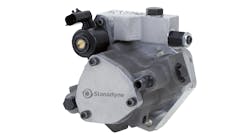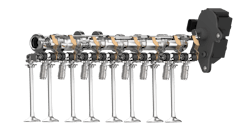Within just a few short years the auto-oriented rivalries and differences between Detroit’s muscular Motor City manufacturing might and the Silicon Valley’s software expertise have become wafer-thin as collaboration and investment are booting up to establish the San Francisco/San Jose region as a key center of vehicle design developments – opening up significant industry job opportunities in the process.
While it might be helpful for an aspiring Silicon Valley technician to have the term “engineer” included somewhere within your list of qualifications, employment listings indicate that hands-on knowhow is in high demand to actually execute the technological innovations. (The region’s prowess in these endeavors will be showcased at the Jan. 5-8 Silicon Valley International Auto Show in San Jose.)
“Silicon Valley’s hot startups employ an increasing number of test drivers, automotive installers and auto mechanics,” says Alison Chaiken, who writes software for advanced, semi-automated cars and trucks along with hosting monthly meetings of the Silicon Valley Automotive Open Source Group.
“We need a lot of them at Silicon Valley startups. As the automotive industry grows here, the need will increase,” Chaiken says. “New sensor technologies will mean more technicians for areas like radar, LIDAR and cameras. If EV research continues to be hot, then experience with all-electric powertrains will also be valuable.”
In April China’s LeEco cut the ribbon on an 80,000-square-foot North American headquarters and autonomous driving research center in San Jose, prompting the prospect of up to 800 new hires.
“Silicon Valley is critically important to our global growth strategy,” says LeEco Chairman and CEO Yueting Jia. “Silicon Valley is known for its unique talent and culture of innovation and inspiration, which aligns perfectly with LeEco’s mission to bring extraordinary experiences to people everywhere.”
A LeEco joint venture with Faraday Future aims to advance EV development under the leadership of executives recruited from Tesla, BMW, Lotus, Jaguar and Ford.
Some of the employee benefits proffered by Faraday include:
• Competitive salaries
• Stock options
• Generous healthcare, vision, and dental care – free to employees and discounted for partners and families
• 401k retirement plan
• Paid relocation
• Engineering orientation and onboarding program
• Employee referral program
• Engaging internship program
• Modern workspace incorporating the latest technologies
• Opportunities to work alongside some of the most accomplished minds in the industry
• Daily catered lunches and food trucks
• Free snacks, fruit, and refreshments
• Free parking – with carpool reimbursement
• Casual dress code and relaxed work environment
• Culturally diverse, progressive atmosphere
• “Soul of Faraday” community outreach team
• Frequent social events, happy hours and team parties
• Foosball and ping pong tables – including tournaments
Help wanted: ASE techs
“We are hiring great people for many positions,” reports Jocelyn Rivera, an executive at the Bay Area-based Beepi online used-car buying and selling site. Vehicle inspection specialists with Automotive Technology degrees and ASE certifications are especially in demand.
“In some areas we’re also hiring apprentices – entry level technicians who want to get their foot in the door and grow into the vehicle inspection specialist role by taking on operational responsibilities at our different warehouse locations,” she says. “In addition, we hire car haulers for both long and short distances to move our Beepi cars to and from our different operations centers.”
Complimenting the Silicon Valley’s pace of staffing startups is a robust array of joint ventures, mergers and acquisitions involving existing automakers eager to leverage the region’s high-tech knowledge base.
Mercedes-Benz’s original workforce of 20 employees when its R&D facility first opened 20 years ago has now grown to more than 240. The center develops technologies such as Autonomous Driving, Advanced User Experience Design and Machine Learning. “We are finding intelligent solutions to synchronize the development cycles of the web and consumer electronics with those of the automotive industry,” according to the company. “This means we are bringing new technologies to the road even faster and more efficiently.”
“As an industry, we are on the verge of some major transformational changes brought on by the convergence of what have been, to this point, largely disparate technology disciplines,” concurs Honda R&D Americas President Frank Paluch, reflecting on last year’s unveiling of its new Silicon Valley research and development facility. “Honda will embrace and help lead this convergence. Our operations in Silicon Valley are a testimony to our focus on this new direction in our product and technology development efforts.”
General Motors’ recent purchase of San Francisco’s Cruise Automation will further accelerate GM’s development of autonomous vehicle technology. “Cruise provides our company with a unique technology advantage that is unmatched in our industry,” says Mark Reuss, GM executive vice president of global product development, purchasing and supply chain. “We intend to invest significantly to further grow the talent base and capabilities already established by the Cruise team.”
Twenty new industry job postings are already in place to attract interested candidates. “We are excited to be partnering with GM,” says Kyle Vogt, Cruise’s founder, “and believe this is a groundbreaking and necessary step toward rapidly commercializing autonomous vehicle technology. GM's commitment to autonomous vehicles is inspiring, deliberate and completely in line with our vision to make transportation safer and more accessible,”
More than 100 employees, up from 15 since 2012, are on duty at the Ford Research and Innovation Center. “Our Palo Alto team has grown significantly this year, using research and innovation to explore and develop future mobility solutions,” says president and CEO Mark Fields. “We’re attracting top talent from around the world to join our team in Silicon Valley, including employees from local technology companies and universities who want to make people’s lives better by changing the way the world moves.”
In May Ford directed an additional $182.2 million toward the San Francisco-based Pivotal cloud computing enterprise. “Expanding our business to be both an auto and mobility company requires leading-edge software expertise to deliver outstanding customer experiences,” Fields explains. “Our investment in Pivotal will help strengthen our ability to deliver these customer experiences at the speed of Silicon Valley, including continually expanding FordPass – our digital, physical and personal mobility experience platform.”
“Investing in Pivotal builds on our current strengths in software development,” adds Marcy Klevorn, Ford vice president and CIO, who is joining Pivotal’s board of directors. “We plan to quickly add new state-of-the-art software engineering capabilities across the Ford enterprise.”
“Having a strong presence in Silicon Valley allows us to further accelerate our research on a wide range of technologies, and apply our insights to create real-world mobility solutions,” says Ken Washington, Ford vice president of research and advanced engineering.
Ford and Pivotal also plan to open new software labs in strategic locations in both the U.S. and Europe. The labs will be staffed with software architects, engineers and “user experience experts.”

